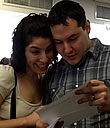FULL STORY
More Einstein Seniors Choose Primary Care Residencies at 2011 Match Day
March 17, 2011 – (BRONX, NY) – Forty-three percent of Albert Einstein College of Medicine of Yeshiva University’s class of 2011 will be going into primary care – 4 percent higher than the national average of nearly 39 percent.

Joshua Hamburger (r) and friendFourth-year medical students at Einstein – and at medical schools around the country – learned today where and in what specialty they will spend their three to seven years of residency training. The much-anticipated annual event, known as Match Day, has been a rite of passage for medical students for nearly six decades, since the National Resident Matching Program (NRMP) was established in 1952. This year’s Match, with 16,559 U.S. medical school seniors applying, represents the largest Match to date.
Of Einstein’s 187 seniors who matched today, 80 will be entering the three specialties that comprise primary care medicine: 47 matched to internal medicine residencies, 22 to pediatrics and 11 to family medicine. This represents an increase of three percent over Einstein’s class of 2010. Primary care specialties made up three of the top five most popular placements for this year’s class. The other two were diagnostic radiology (18 matches) and emergency medicine (17 matches). Sixty-two percent of the class chose these five specialties.
Video: Watch the excitement unfold as students open their Match Day envelopes ![]() .
.
Rounding out the top ten (with ties) were: obstetrics and gynecology (10 matches), anesthesiology (10), surgery (8), ophthalmology (8), orthopedics (7), psychiatry (7).
Nationally, for the second year, more U.S. medical school seniors matched to primary care residencies, including an 11 percent increase in family medicine positions. The most competitive fields for applicants this year were dermatology, orthopedic surgery, otolaryngology, plastic surgery, radiation oncology, thoracic surgery, and vascular surgery.
Match Day is conducted annually by the NRMP, a private, not-for-profit organization established at the request of medical students to provide an orderly and fair mechanism to match applicants and open residency positions. It uses a computerized mathematical algorithm to align the preferences of applicants with the preferences of residency programs in order to fill the residency training positions available at U.S. hospitals.
Other Top Stories
9/11 World Trade Center Exposure Linked to Heart Disease Among NYC Firefighters
On Becoming a Physician: New Einstein Students Receive White Coats and Stethoscopes
Novel Therapy for Acute Migraine Shows Promise in Phase 3 Clinical Trial
First Complete Wiring Diagram of an Animal's Nervous System
Multimillion Dollar NIH Grant to Help Reduce Opioid Use & Get Care to People Who Need It
NIH Grant Funds $23 Million Study of Diseases Affecting People Living with HIV
New TAILORx Data Guides Adjuvant Therapy in Younger Breast Cancer Patients
Einstein Celebrates Its 61st Commencement
Bolstering Biopsies: Testing Patients' Individual Cells to Guide Treatment



Tablet Blog